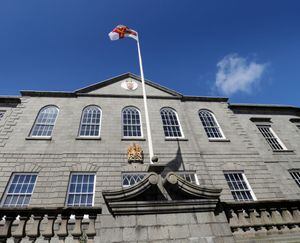Island-wide voting is a sign of the journey beginning
GUERNSEY’S election landscape has changed – that is a given after the referendum result.

But when a senior politician tweeted in response – ‘Time to move on #Guernsey – the people have spoken – more important things to get on with #nothingtoseehere’ – he really missed the point.
Because what runs through all the votes for change, whichever system was supported, was dissatisfaction with the performance of this Assembly.
So there really is something to see – and shutting down the conversation is not the way to go about it.
There is an out-of-touch arrogance that has invaded some decision-making – an inability in some quarters to communicate with all parts of the electorate, to explain and debate policy positions without it turning into a skunk fight.
It is that, more than anything, which has led to things like a petition to sack the Environment & Infrastructure committee gathering 2,700 signatures and counting.
For several the petition will be dismissed as a minority of troublemakers, of internet trolls, of reactionaries, to be ignored in the hope they sink without trace.
And there probably are plenty of people out there who are positively glowing in their support of the policy agenda being pursued by E&I, or at least nonplussed by it, but boy are they a difficult committee for anyone to like at the moment, even if you wear your bobble hat with pride.
Just because a policy or agenda is unpopular doesn’t, of course, mean it is wrong. Zero-10 is a prime example, but even that has had to change and adapt, be sold to the community and then moulded to reflect the changing local and global landscape.
There is too much entrenchment being shown.
Fuel duty is another example.
Like groundhog day, P&R has stuck to a real-terms increase, but this ignores the reality that not everyone’s wages are doing the same.
It is a revenue stream they are clinging on to that simply angers the public, makes everyday life more expensive for everyone and has questionable environmental benefit in terms of affecting behaviour in Guernsey, its other purpose nowadays.
If you read the Budget P&R comes across as bereft of ideas here, apart from being insistent the hike is needed. It’s unpopular, but an easy money-spinner that it does not want to get drawn into a debate on.
The UK has frozen fuel duty there for nine years – Jersey’s rise this year is much less, so there are alternative ways forward – a conversation to be had and had now.
It should not go unnoticed that the 2019 fuel hike raises an extra £500,000 – Education, Sport & Culture and Home Affairs have failed to deliver promised savings totalling £3.92m. which have to be paid for by the public every year until they do.
Of course, the States is much more adept and skilled in its relationships with the business community than it is with the public at large. It welcomes them into the room – with the public it is all too often a gesture if it happens at all.
To dismiss the increasingly polarised nature of politics and its engagement with the public as meaningless would be a massive mistake.
This is an island that is starting to splinter and those noisy few will grow in number and importance with the advent of island-wide voting and the combative political arena it will usher in.
The 2020 election will be too early for political parties to really have a grip and decisive influence, but we know these groupings will emerge.
While island-wide supporters will be gleefully expecting their vote to dump their particular figure of hate, the reality is that name recognition will be all in two years’ time and standing politicians will begin with a head start that will be difficult to overcome.
But if 2020 is not an organisational nightmare, and against the odds delivers a better calibre of politician and therefore better government, there is nothing to stop island-wide voting continuing and parties will become an increasingly influential part of the landscape.
This is the start of that journey.
How they are formed, the policies and manifestos, the influence they have, the scrutiny and drive they provide, the voice they give the electorate, could all be a change for the good, but get it wrong and it will be a disaster.
The political stability that is the island’s saviour in a time of global uncertainty would be lost, the chance for extreme policy lurches not just from term to term, but from issue to issue amplified.
This system of government is not working.
It is bogged down, introspective.
Island-wide voting is not the cure, but it creates an opportunity to have one.
There really is something to see, something to be debated and discussed.
It is an exciting and unique time – the challenge for this Assembly and all those interested in politics is to take advantage of that.





